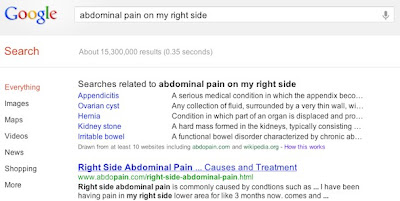This week, Google improved search results for health-related queries. When it detects that you're searching for symptoms of illness, it displays a list of new search queries for health conditions that might be related. Google now crawls the Web and gathers health information from articles, producing this list algorithmically.
Clicking an item in this list sends you to a new search for that health condition with the Web results below. Google used to keep its own Google Health database for users to track their health and medical records, but it shuttered that program last year. Google has rolled up many types of searches into its own properties, but in the case of health, it has decided to do things the old Google way and let the Web handle it.
Universal Search Is Not For Everything
Google is the go-to place for most people to find answers online. As that trend became clear, Google introduced Universal Search in 2007, so its search results could display multiple kinds of results. Instead of just showing its text list of websites, Google's main search started to incorporate images and videos. More recent additions include travel searches. But in the area of health, Google tried to roll its own service and then decided against it.
Google also used to offer a service called Google Body, which was a 3D browser of the human body. How cool would that have been as an interface for health searches? But this year, it decided to dump that as well, passing it off to Zygote Media Group, the company that provided the 3D body imagery. It's now an open-source project, so you can use it build whatever kind of crazy health app you want.
The World Wasn't Ready For Google Health
Google Health was around for three years, but it was ahead of its time. It was a long-term effort to make a patient-centered cloud database of medical history upon which health care providers could build. Clearly, one reason it wasn't widely adopted was that the health care industry wasn't ready. But this required substantial buy-in and trust from patients, i.e. Google users, as well.
Google couldn't make good health recommendations on its own without health data on its users. Google Health required people to maintain their own health records on a hosted Google service. That's sensitive information. Can you imagine today's Google maintaining health records on its users? In the eyes of the press, Google can't even get away with its existing privacy policy. Imagine the terms and conditions if Google had access to your medical records!
But the trade-off of giving Google access to your data is that its services can be better tailored toward you. That might not be so interesting for social search with Google+, but the effects are magnified if you think about health. If Google had your personal medical history in its database, your health searches could be specific to your condition. But if Search, plus Your World is too much, don't hold your breath for Search, plus Your Body.
Google-Patient Confidentiality
So how does Google's new symptom search handle privacy? Even if it doesn't have your medical history, health searches can be quite sensitive. A study found that "Chlamydia" was the most common health search term on mobile devices last year. People probably don't want Google snooping on those queries.
Google's symptom search FAQ says that health searches are logged like any search, but ads and search results won't be personalized based on them. Remember, you can always clear your Google search history at google.com/history.
And hopefully this goes without saying, but don't rely on an Internet search for a diagnosis. The new Google symptom search is very handy, but if you're concerned about your health, your best bet is to go to the doctor.
Writer: Jon Mitchell



















